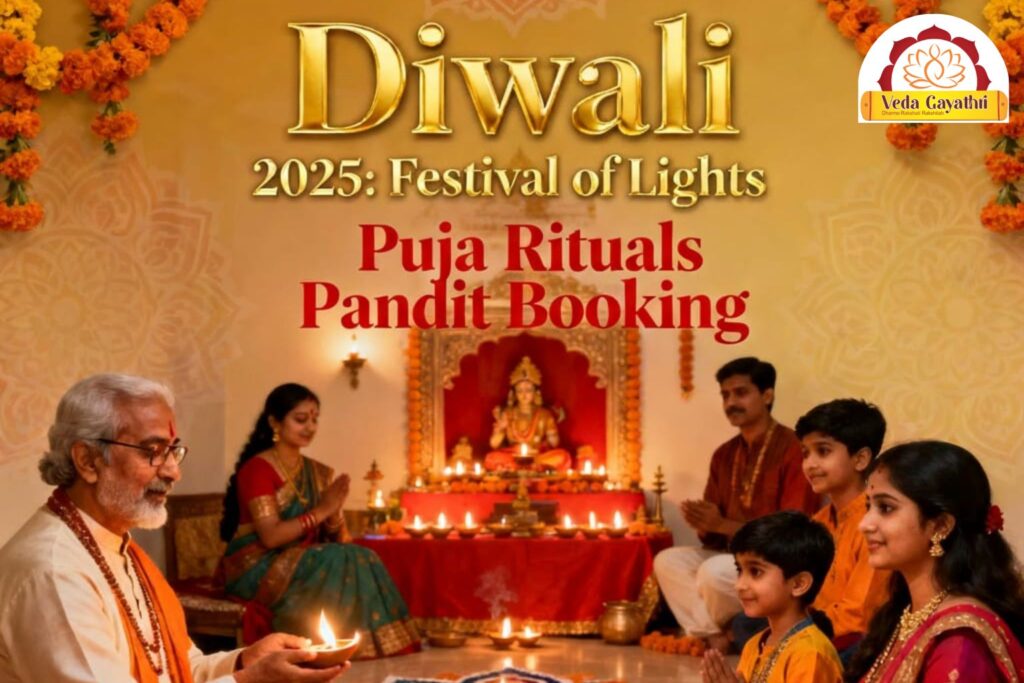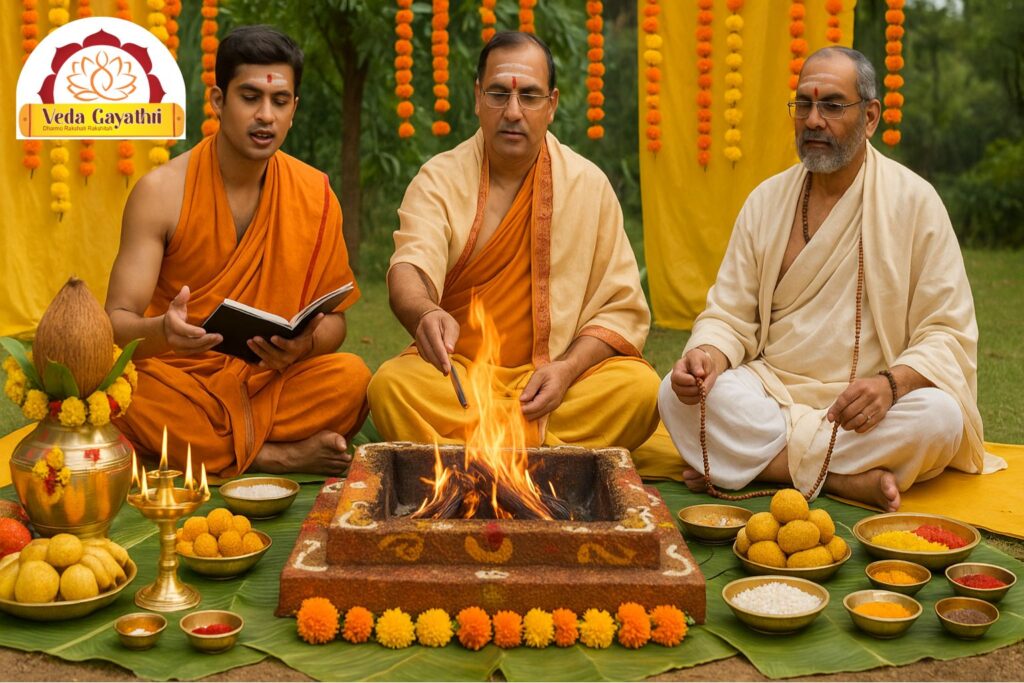Diwali 2025 – Festival of Lights, Puja Rituals & Pandit Booking with Veda Gayathri
Diwali 2025 – Festival of Lights, Puja Rituals & Pandit Booking with Veda Gayathri 🌟 1.What is Diwali? Diwali, also known as Deepavali, is one of the most celebrated and spiritually significant festivals in India and among Hindu communities across the world. The word “Deepavali” originates from the Sanskrit words ‘Deepa’ (lamp) and ‘Avali’ (row), meaning “a row of lamps.” Symbolically, Diwali marks the victory of light over darkness, good over evil, and knowledge over ignorance. It is not merely a festival of lights but a profound celebration of life, hope, and divine energy. Diwali holds a special place in the hearts of millions because it represents spiritual awakening and the renewal of positive energy. Across India, homes are illuminated with rows of oil lamps (diyas), colorful rangolis, and decorative lights, creating an atmosphere filled with warmth, joy, and divine presence. From ancient scriptures to present-day celebrations, Diwali has remained a timeless festival that unites families, strengthens faith, and spreads happiness across generations. 🕉️ The Spiritual Significance of Diwali At its core, Diwali is deeply spiritual. It reminds us that light (truth and wisdom) always triumphs over darkness (ignorance and negativity). In Hindu belief, this light represents the divine consciousness within every soul — the eternal flame of purity and truth that guides humanity toward dharma (righteous living). For many, Diwali is a time to cleanse not only homes but also hearts — to let go of anger, ego, and envy, and to embrace love, harmony, and spiritual growth. Lighting the lamp is symbolic of invoking the inner divine light, dispelling ignorance, and inviting Goddess Lakshmi (the goddess of wealth and purity) and Lord Ganesha (the remover of obstacles) into one’s life. Every diya that glows on Diwali night represents a prayer — a prayer for peace, prosperity, and the victory of good intentions. 🪔 The Historical Background of Diwali The origins of Diwali are as diverse as India’s culture itself, with different regions celebrating it for different reasons: In North India: Diwali marks the return of Lord Rama to Ayodhya after defeating Ravana and completing 14 years of exile. The people of Ayodhya lit thousands of lamps to welcome their beloved king, symbolizing joy and victory. In South India: Diwali is celebrated as the day Lord Krishna defeated the demon Narakasura, freeing the people from suffering. Hence, it is also known as Naraka Chaturdashi. In Western India: It signifies Lord Vishnu’s victory over the demon King Bali, symbolizing the triumph of dharma over adharma. For Jains: Diwali commemorates the day Lord Mahavira attained nirvana, marking liberation from the cycle of birth and death. For Sikhs: It celebrates the release of Guru Hargobind Ji from imprisonment — known as Bandi Chhor Divas. Despite these diverse stories, the essence of Diwali remains the same — the celebration of divine victory, renewal, and enlightenment. 🎇 Cultural Importance of Diwali Across India Diwali transcends religion and region — it is a festival of unity, celebrated by people of all backgrounds with equal devotion. From bustling cities to peaceful villages, Diwali brings people together in shared joy and devotion. Homes are cleaned and decorated with flowers, torans, and rangolis to welcome divine energy. Families perform Lakshmi Puja in the evening, invoking blessings of wealth, fortune, and happiness. Diyas and candles are lit in every corner of the home, symbolizing the removal of darkness and negativity. People exchange sweets and gifts, strengthening family bonds and community relationships. Fireworks and celebrations illuminate the skies, representing the brightness of new beginnings. In villages, traditional rituals and bhajans are performed, while in cities, people decorate offices and temples with lights, flowers, and idols of Lakshmi and Ganesha. For children, it’s a time of excitement and joy; for elders, a time of devotion and reflection; and for everyone, a time to celebrate gratitude and prosperity. 🌼 The Symbolism Behind Light and Prosperity The lamp lit during Diwali has profound meaning in Hindu philosophy. The flame of the diya represents spiritual knowledge, which dispels ignorance — the true darkness of life. Just as one lamp can light many others without losing its brightness, the act of lighting diyas reminds us that spreading kindness and wisdom only multiplies positivity. Goddess Lakshmi, the central deity of Diwali, is invited into every household through light, cleanliness, and devotion. People believe that a clean home and pure heart attract divine blessings. Thus, Diwali is as much about inner purity as it is about external celebration. At Veda Gayathri, we emphasize this divine connection through traditional Lakshmi Puja, Ganapati Havan, and Kubera Puja, performed by trained Vedic pandits who ensure every mantra, offering, and ritual is done with utmost devotion and precision. 🪔 Celebrating Diwali with Veda Gayathri In today’s fast-paced world, the true essence of Diwali often fades amidst the noise of celebrations. That’s why Veda Gayathri brings back the authentic Vedic way of celebrating Diwali, where every puja is performed with sacred mantras, pure samagri, and traditional devotion. From Lakshmi Puja to Deepa Aradhana, from Kubera Havan to Corporate Group Pujas, every ritual performed by Veda Gayathri’s certified pandits ensures divine grace and auspicious energy in your home or workplace. 🙏 2. Why is Diwali Celebrated? Diwali, also known as Deepavali, is celebrated with immense devotion and joy throughout India and across the world. Beyond the dazzling lights and festive sweets, Diwali carries deep spiritual and mythological significance that connects every devotee to the divine. It symbolizes victory, gratitude, renewal, and the triumph of dharma (righteousness) over adharma (injustice). Across different regions, the stories and reasons for celebrating Diwali vary, yet they all share one universal message — 🕉️ “Light always triumphs over darkness, and good always conquers evil.” 🕉️ The Return of Lord Rama to Ayodhya (North India) One of the most well-known legends of Diwali comes from the Ramayana. After fourteen years of exile and his victory over the demon king Ravana, Lord Rama, along with Sita Devi and Lakshmana, returned to Ayodhya. The people of Ayodhya, overjoyed by their
Diwali 2025 – Festival of Lights, Puja Rituals & Pandit Booking with Veda Gayathri Read More »


